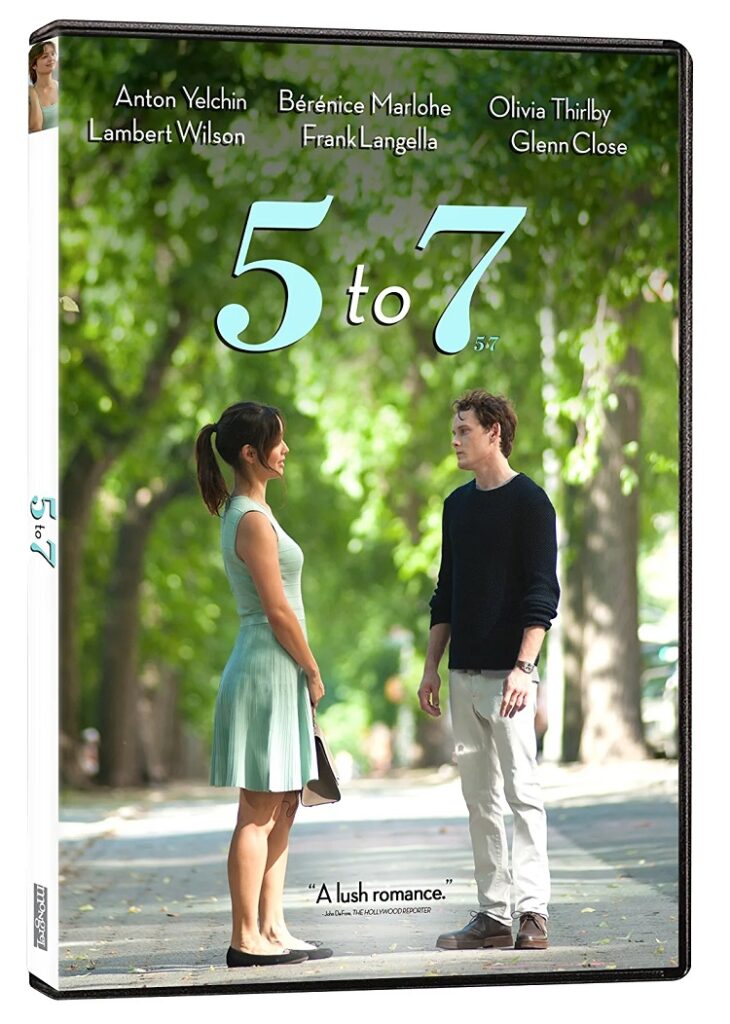
Watching 5 to 7 is like eating an entire box of creamy, sugary, overstuffed bonbons. The first few are delicious, but at some point you’d pay cash money to never eat, or even see, another dessert for as long as you live.
The syrupy sweetness that strangles the film is doubly depressing because 5 to 7 starts so well. Set in a fairy-tale Manhattan where unpublished short-story writers can afford nice one-bedroom apartments, the film starts as a culture-clash romance between 24-year-old Brian Bloom (Anton Yelchin) and 33-year-old Arielle (Bérénice Marlohe), a beautiful, sophisticated French woman who just happens to have a husband and two hyper-adorable children. That’s OK, she and hubby Valery (Lambert Wilson) have a “cinq à sept” arrangement: each can have an affair as long as it’s limited to certain hours (in this case literally the five to seven of the title), as well as to certain venues. Very civilized, very French.
The husband’s liberality even extends to befriending Brian himself, because his affair with Arielle has had such a positive effect on his wife. And in a too-neat turn, Valery’s mistress (Olivia Thirlby) is a book editor who will be instrumental in launching Brian’s so-far-stalled writing career.
What for some guys would be a dream come true, a no-strings affair with a sexy femme, is troubling – at least at first – to the uptight, insecure, nice Jewish boy Brian. As he says, “In my culture, if we didn’t have things to judge, we wouldn’t know what to do all day long.”
These and other witty epigrams flow for the film’s first hour or so, and the actors are graceful and appealing. It’s also a treat to see Glenn Close and Frank Langella as Brian’s long-married parents, tolerant of each other’s obsessions and idiosyncrasies but loving all the same. Only Langella is really outraged by the impropriety his son has become a part of, and even he is won over by Arielle’s charms.
Well, it’s all early-Woody-Allen/J.D. Salinger fun-and-games until somebody breaks the rules by actually falling in love, and here’s where the movie starts to go terribly wrong. I can sort of accept that Brian wins a New Yorker fiction prize even though he’s never had a story published professionally anywhere. (Remember, this is fairy-tale New York.) I can buy that eventually he wants to be more than Arielle’s time-limited lover and that he proposes to her, and I can even swallow that she considers leaving her husband and kids for him. (Arielle prizes hubby’s kindness, stability, and “goodness,” and I’m sure his money and social position don’t hurt either.)
But when the hubby, learning that his wife plans to leave him, shows up at Brian’s apartment, slaps him across the face as if about to challenge him to a duel, and then hands him a check for a quarter million dollars with the whispered injunction, “See to her,” I lost it. This is the kind of old-time meller-drama that Preston Sturges parodied so skillfully in the Rex Harrison dream sequences in 1948’s Unfaithfully Yours.
But instead of going all the way into high camp, 5 to 7 slows down and then drowns in self-indulgent voice-over from a heartbroken Brian. As compensation, Arielle becomes his muse and his lost perfect love, and he becomes hers. Well of course it’s a perfect love, it was frozen in place well before messy, colicky kids; arguing over whose turn it is to take out the garbage; farting in bed; and hair clogging the drain.
Oh well, this shows that even for a romance-movie addict like me, some stories are just too precious for words. I don’t blame the actors – Yelchin and Marlohe are quite good – but I do blame the director/screenwriter Henry Levin. He apparently doesn’t realize that with capital-R Romance, you need a little medicine to make the sugar go down.